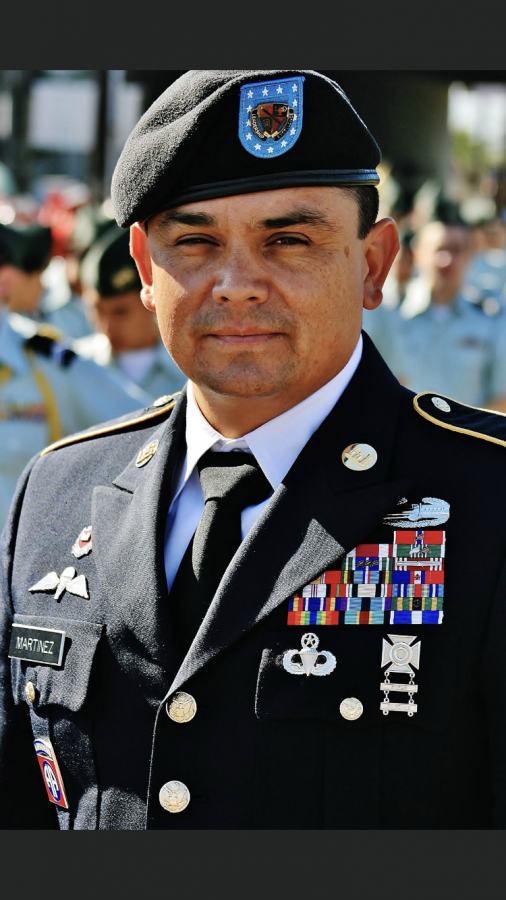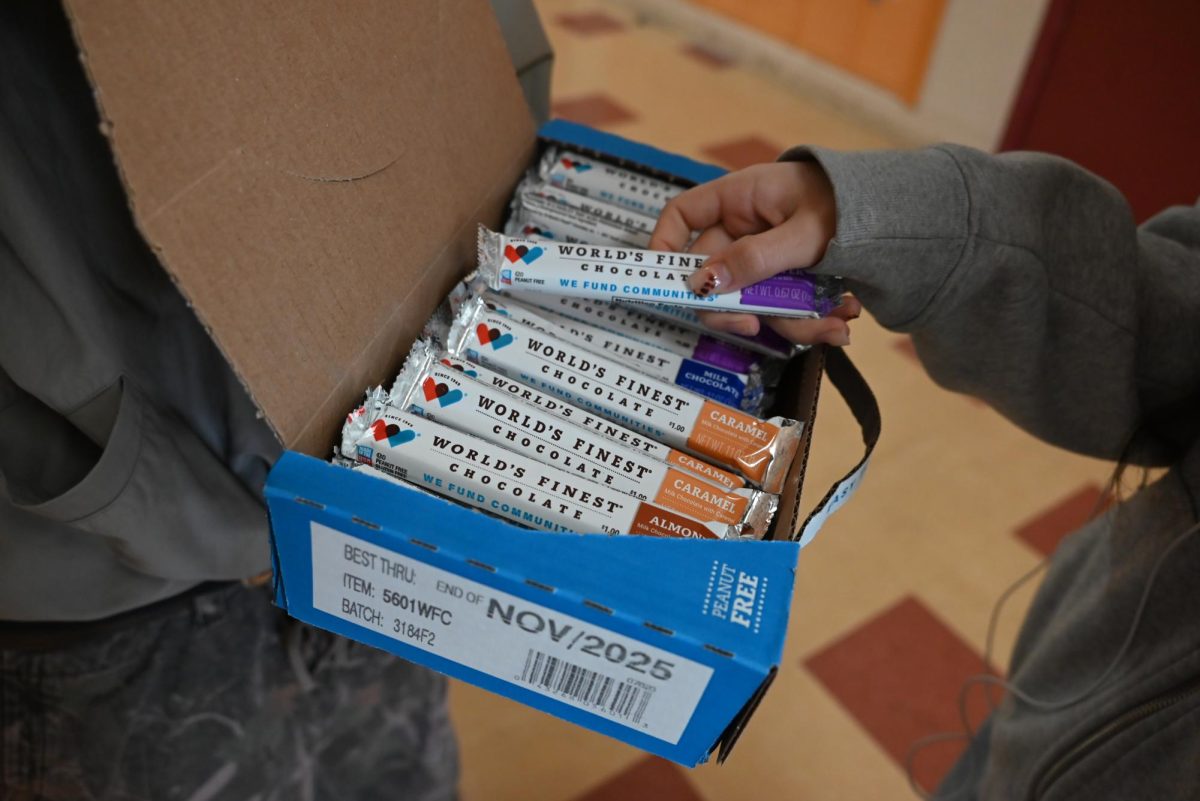SFC (R) Jorge Martinez: JROTC improves citizenship
One of the major areas taught in Army JROTC is Citizenship, something taken for granted by many students.
COURTESY | SFC(R) JORGE MARTINEZ
SFC(R) Jorge Martinez is the Army Instructor for Van Nuys JROTC.
Nov 19, 2019
The two major areas that we teach in Army JROTC here at Van Nuys High School are Leadership and Citizenship. Citizenship is the part of the JROTC curriculum that I will explore today. Citizenship is something taken for granted by many citizens and is not taught formally in a regular high school curriculum. Citizenship is taught in depth in JROTC and demonstrated through service learning for our school, community, state and nation. Service learning is not community service. Service learning is a two- way experiential process where students provide service and simultaneously learn what it means to be a citizen in our great country. In these times where democracy seems to becoming more and more difficult in this polarized era it is a good idea to examine our citizenship responsibility and required skills as citizens of this country. The question becomes then how do become more effective citizens in order to improve our democratic government? Let’s examine seven citizenship skills that can improve our individual skills as citizens.
The first citizenship skill is Cooperation. The Preamble to the Constitution states “We the people,” not we the individuals. The premise ventured here is that we can rule our country more effectively if we cooperate as a group to solve problems. High school students are taught routinely in cooperative and collaborative learning groups so they have extensive experience in this skill set. We know that cooperation involves thinking as a group with each person helping the group succeed based upon the time and circumstances. High school students instinctively know that achieving the common goals of the group can come at the expense of individual ideas, thoughts and opinions. We need to take this same skill and apply it to our role as a citizen in our country. We must work together as citizens to develop a common end state for our country that is based upon our time honored values and history. We have come together as a nation to overcome a world-wide depression, two world wars and a civil war. These challenges were overcome by a cooperative citizenry united to solve these huge challenges.
The second citizenship skill is Patience. The framers of our constitution demonstrated patience in their effort to form a “more perfect union.” The Articles of Confederation were not working the way our Founding Fathers wanted which prompted the development of our Constitution. The Constitution was developed over a period of time until the framers decided it was ready for publication. This required patience and the wisdom to know when it is best to wait until you have the best solution possible. Patience is not just waiting for something to be as perfect as possible, it is knowing when it is time to finalize the product. It is difficult in today’s instantaneous world to wait because everything happens so quickly in our technological reality. Instant gratification is now programmed in our culture making patience a difficult skill to master. Regardless, patience is a critical citizenship skill because we need to contribute to the discourse in our country in a deliberate and thorough manner.
The third citizenship skill is Fairness. The basis of this is in the Declaration of Independence. When establishing justice, the “common good must be weighed against individual desires.” A sense of fairness is established in our country when Americans believe that everyone is equal under our laws and no one is above our laws. As citizens, we have an obligation to elect representatives and judges who we believe will faithfully execute the laws of our country in a fair and equitable manner. The United States ideal of equality is a good representation of the fairness citizenship skill. Promoting equality has some inherent conflict on how we interpret this concept for the good of our country. Do we adjust standards so everyone becomes equal in our country or do we promote individual opportunity so everyone is provided a pathway to equality?
The fourth citizenship skill is Respect. The Preamble to the Constitution states that we must strive for “domestic tranquility.” This has been the challenge that became the grand experiment that is the United States of America. The United States started as a diverse country and has only become more diverse as many different people from many different countries with many different backgrounds have immigrated to this country. Respect for each other, regardless of someone’s background is a key citizenship skill that must be exercised in order to achieve domestic tranquility. Accepting and incorporating the various differences in our citizenry is the ideal we must strive to achieve. Recognizing everyone’s equality is demonstrating respect for our fellow citizens. A key to success with respect as a citizenship skill is to evaluate those around you based on their skills and not their appearance or background.
The fifth citizenship skill is Strength. The preamble to our Constitution states the requirement for a “common defense.” Our founding fathers viewed common defense as a nation of citizens with strong beliefs. The citizenship skill of strength means that we must be a nation of citizens with strong convictions for what they believe in. As humans, we have a strong sense of wanting acceptance by others. Standing up for what you believe is right risks rejection and acceptance by others. Peer pressure is a very difficult condition to withstand. It is always much easier to go with the flow than stand up for your convictions, especially when they may be in the minority. Strength means standing firm with your beliefs, even if others may view this as being uncooperative. At the same time, we must have the fortitude to allow other citizens to stand up for their beliefs.
The sixth citizenship skill is Self-Improvement. The Preamble to the Constitution states that we must “promote the general welfare”. Our founding fathers meant that we should become a prosperous nation. Becoming a prosperous nation, requires educated and trained citizens. We have always been viewed as a nation of achievers that are always trying to increase our national wealth and prosperity. The citizenship skill of self-improvement is vital in our nation’s efforts to grow and prosper. Our public school system has been an integral part of our nation’s effort for self-improvement. A significant part of our nation’s wealth is devoted to our nation’s educational institutions from Kindergarten through Graduate School. Our nation would not allocate these resources unless self-improvement wasn’t a vital part of our nation’s welfare. As individual citizens, we must strive to take advantage of this national resource to improve ourselves for the good of our nation.
The seventh citizenship skill is Balance. To “secure the blessings of liberty”, as stated in the Preamble of the Constitution, our founding fathers challenged the citizens of our nation to follow the ideals of the Declaration of Independence. This was meant to be finding solutions to our problems through a balance between the needs of the nation and the needs of the individuals of this country. The citizenship skill of balance challenges our citizens to accepting that there are at least two sides to every issue and never enough resources to satisfy every requirement. We are challenged to find a solution that is viewed as winning for both sides. At the national level, this balance has become the conflict between national interests and state’s rights. Our founding fathers knew that there was always going to be conflict between the nation as a whole and individual state’s rights. The solution in our Constitution was to divide up power between the federal and state governments. The federal government was granted power over institutions that required a national effort such as international affairs, national defense and interstate trade. The states were given all remaining power that was not specifically stated as belonging to the federal government. The federal government retained the right to mediate differences between states. At the individual level, the citizenship skill of balance calls for citizens to be informed in the nation’s affairs and critically analyze the competing debate for the issues of our country in a fair and equitable manner.
Throughout the history of the United States, our citizens have utilized these preceding seven citizenship skills to sustain and improve our country. It is vital for our countries growth and prosperity that all of the citizens of our nation exercise their citizenship skills for the greater good of the United States.







